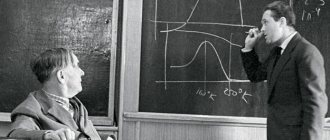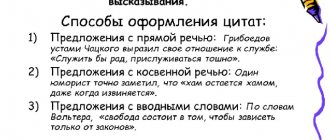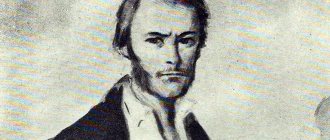Apology of a madman: 7 quotes from the works of Pyotr Chaadaev
Petr Yakovlevich Chaadaev
(1794 - 1856) was one of the most influential Russian thinkers of the 19th century. The founder of Westernism in Russian philosophy, in his works he harshly criticized Russian reality, Orthodoxy, ignorance and the cultural backwardness of the country. For his writings, Chaadaev was officially declared crazy, and his books were banned from being published on the territory of the Russian Empire.
The central works in his work were “Philosophical Letters” (it was because of them that he fell into disgrace) and the “Apology of a Madman” that followed. In these treatises, Pyotr Yakovlevich contrasted Russian foundations and traditional values (according to the author, “relics of the past”) with progress and European enlightenment. These works had a huge influence on the development of Russian philosophical thought and gave rise to a centuries-old dispute between “Westerners” and “Slavophiles”, which continues to this day.
We have selected 10 quotes from these works.
About Russia
| Sometimes it seems that Russia is intended only to show the whole world how not to live and what not to do. |
| Our power holds the world in awe, our power occupies a fifth of the globe, but we must admit that we owe all this only to the energetic will of our sovereigns, which was facilitated by the physical conditions of the country we inhabit. Crafted, molded, created by our rulers and our climate, it was only through submission that we became a great people. Look through our chronicles from beginning to end - you will find in them on every page the deep influence of power, the constant influence of the soil, and almost never will you encounter manifestations of public will. |
| First wild barbarism, then crude superstition, then foreign dominion, cruel and humiliating, the spirit of which the national government subsequently inherited - this is the sad story of our youth. |
About patriotism
| A beautiful thing is love for the fatherland, but there is something even more beautiful - this is the love of truth. |
| I prefer to castigate my homeland, I prefer to upset it, I prefer to humiliate it, just so as not to deceive it. |
| I did not learn to love my homeland with my eyes closed, my head bowed, my lips closed. I find that a man can only be useful to his country if he sees it clearly; I think that the time of blind love has passed, that now we first of all owe the truth to our homeland. I love my fatherland, as Peter the Great taught me to love it. I confess that this blissful patriotism of laziness, which adapts to see everything in a rosy light and rushes around with its illusions, is alien to me. |
About the people
| We have something in our blood that rejects all real progress. In a word, we lived and are still living in order to teach some great lesson to distant descendants who will understand it; for now, no matter what they say, we constitute a gap in the intellectual order. |
After the words of one of the pillars of the empire, who was trying to save the moribund Russian autocracy, and he, by the way, takes second place in the “Name of Russia” rating, we will give a global example of the epistolary television genre of the early 21st century, I mean the appeal of Russian President Dmitry Medvedev to Viktor Yushchenko, in which states with pathos: “For Russia, Ukrainians from time immemorial have been and remain not just neighbors, but fraternal people, for whom we will always have the kindest feelings, with whom we are united by a common history, culture and religion, united by close economic cooperation, strong family , human connections."
After reading this, I just want to answer the president with a famous phrase from the work of A. Griboyedov: “The legend is fresh, but it’s hard to believe!” But I can’t do that either! I’ll say frankly and directly: “I don’t believe it!”
I don’t believe that for Russia Peter I, Catherine II, Nicholas I, Alexander II, Joseph Stalin, Ukrainians were a fraternal people! For official Russia, for its ruling elite, Ukrainians have never been a fraternal people. For such Russians as Karl Bryullov, Alexey Venetsianov, who freed Taras Shevchenko from the yoke of serfdom - yes, the Ukrainians really were a fraternal people! For the Russian writer Ivan Bunin, who wrote about Ukraine with subtle lyricism, Ukrainians were a fraternal people! For millions of Russians who gave their lives in the battles for the liberation of Ukraine from the brown plague during the Great Patriotic War, Ukrainians were a fraternal people! For the Russians - the liquidators of the Chernobyl tragedy - Ukrainians were a fraternal people!
But to believe that for the current leadership of Russia, Ukrainians are a fraternal people, forgive me, but this is a big... untrue, because the events of recent years both around Tuzla, and in the gas issue, which Russia has brought to the point of absurdity, I mean the hysterical gas blockade of us and Europe at the beginning of 2008, and the “valuable” instructions of the Russian leadership on how to cover our history and which of the Ukrainian historical figures to heroize and which to anathematize, as well as a number of other “friendly” actions of the fraternal country do not give reason to believe in the sincerity of these words
Perhaps President Medvedev could have been trusted if he had come to Kiev on November 22, 2008, to honor the memory of the victims of Stalin’s genocide, and if he had not come, he would have issued a decree to honor the memory of the victims of the Holodomor among the Russian population, because the number These victims in the Russian Federation itself are determined by seven-digit figures. Judging by his position, he will never do this...
Nine months have passed since that autumn evening when Ukrainians lit candles in memory of millions of starved compatriots. This is exactly the amount of time needed for a baby to form and be born in the mother’s womb. And this is symbolic, because on the summer evening of August 23, the peoples of the European Union lit memorial candles on the windows of their houses for the first time in memory of the victims of the misanthropic Nazi and Stalinist regimes.
The candle is burning again on the windowsill of my room. Quiet summer evening. The window is wide open. A candle is reflected in the glass, and it seems that there are five of them. I go out onto the terrace. A gentle August evening slowly envelops the earth. In the western sky, across the river, a thin crescent of the new moon can be seen. A bright star shone in the southeast, the first to appear in the evening sky. It's getting dark. More and more stars are being sown in the sky. The month disappeared over the horizon. Finally, the star road of the Milky Way ran from the northern to the southern horizon.
Night has come. In the light of a candle, against the background of dark foliage, light specks are visible - these are the fruits of the Semerenko ranet. Quince, invisible among other trees. Its fruits ripen even before late autumn. From Apple Savior to Intercession lasts my favorite time, which I call the Festival of Antonov Apples. Every year, at this time, I reread Ivan Bunin’s story “Antonov Apples.” A thousand-voiced choir of crickets sings its magical melody in the garden, and it seems that the whole Universe is filled with it. And it seems that you have dissolved and are floating in the ocean of this monotonous, but truly cosmic music. It is at this time of year, when the night sky is the most beautiful, and the soul unites with the harmony of the Universe, you understand the vanity of human life, you feel the transience of time and the essence of existence...
Peering into the depths of the cosmic abyss where the Milky Way lies, Bunin’s words come to mind: “And the black sky is lined with fiery stripes by falling stars. You look for a long time into its dark blue depths, overflowing with constellations, until the earth begins to float under your feet. Then you will wake up and, hiding your hands in your sleeves, quickly run along the garden alley to the house... How cold, dewy, and how good it is to live in the world!” How good it is to live in the world! Is it possible to deny this simple, but in fact holy truth? But there were also those who denied...
The creators of the thousand-year Reich and the communist “third Rome” did not share these views on life, and in cold blood, without burdening themselves with moral sentiments, they destroyed millions of people who:
And I wanted to live like this, Lord! I wanted to love, I wanted a little year, I wanted to marvel at the world for an hour.
And this evening, when Europeans lit candles in memory of the victims of the Nazi and Stalinist regimes, I am convinced that candles of grief will burn in the homes of a few Russians, but I am sure that they will burn in Yuri Afanasyev and other representatives of democratically-minded Russia.
But whether the funeral lights will light up for the President and Prime Minister of the Russian Federation, for the members of the “Presidential Commission to counter attempts to falsify history to the detriment of the interests of Russia” and the Patriarch of the Russian Orthodox Church is a big question...
“You can’t understand Russia with your mind, you can’t measure it with a common yardstick: It has become something special - You can only believe in Russia.”
This quatrain by Fyodor Tyutchev is a brilliant description of both the Russian state and the mentality of Russians, and their irrational behavior and historical progress. It was these lines that sanctified the myth about the romantic and beyond rational explanation “mystery of the Russian soul” and about the mysterious “Russian Sphinx.”
Three decades before these lines were written, the “secret” of the Russian soul was understood by a young man who came to Russia, or rather to its capital, St. Petersburg, who was destined to lead Russian literature onto the milestone path along which it continues to this day. It was he, not a Russian, but a representative of an oppressed nation, who managed, first at the subconscious level, and later mentally, to understand the essence of Russia. And this realization later became the drama of his life and premature death.
Nikolai Gogol, it was he, the son of the people despised by Catherine II, who would become the bearer of Ukrainian influence on Russian culture in the 19th century and the continuer of Ukrainian cultural expansion to the “third Rome,” which began in the 17th century and continued throughout the 18th century. And no accusation of sins against Russian literature: of “deviation from the rules of taste and the laws of grace”, of “mistakes against spelling” by N. Polevoy and many other ill-wishers, could stop the further triumphal march of his work, which crossed the borders of the empire and became a phenomenon on a universal scale.
About the secret of the Russian soul, which is the essence of Russia, N. Gogol writes in “Selected Passages from Correspondence with Friends”: “Dead souls” did not frighten Russia so much and made such a noise inside her, so that they would reveal some of her wounds or internal illness, and not because they presented stunning pictures of triumphant evil and suffering innocence. It didn’t happen at all... I would sooner be forgiven if I exposed the picture monsters; but they didn’t forgive me for the vulgarity. The Russian man was frightened by his insignificance more than all his vices and shortcomings... When I began to read to Pushkin the first chapters of “Dead Souls”... he began to become more and more gloomy, and finally became completely gloomy. When the reading ended, he said in a voice of melancholy: “God, how sad our Russia is!”... From then on, I began to think only about how to soften the painful impression that “Dead Souls” could make.
“Vulgarity” and “insignificance” - these words, according to Nikolai Gogol’s definition, are the key to unraveling the so-called secret of the “mysterious Russian soul” and the very essence of its centuries-old history.
The immorality of the authorities towards their subjects, towards the outside world, the immorality of the subjects towards themselves, their neighbors and the authorities themselves, as well as towards the memory of those who were destroyed by the immoral criminal authorities throughout the entire period of their rule, is the vicious circle that Russia cannot break for centuries. The question rightfully arises: does she want to do this?.. Observing the course of events in today's Russia, we can say with confidence that neither the top nor the bottom wants this. True, there are individual representatives of the Russian ethnic group with a democratically oriented consciousness who would like to break this circle, but they are unable to do this, because the Russians themselves do not want this.
Gogol’s correctness regarding the immorality of the Russian government is eloquently evidenced by the fact that after the death of the writer, St. Petersburg censorship forbade Ivan Turgenev to even publish an obituary, and when he published it in Moskovskie Vedomosti, he was arrested and expelled from the capital.
All Gogol’s attempts to describe the ideal image of Russia in the second volume of Dead Souls ended in complete failure, because creating something that does not exist in nature is beyond the power of even a brilliant writer. To Nikolai Vasilyevich’s credit, he acted highly morally by burning the second volume of Dead Souls.
The only thing the writer was capable of, trying to show a different Russia, was the well-known lyrical finale in the first volume about the “three bird”, which flies to God knows where, terrifying the peoples and states who, looking sideways, give in and give it the road. But in these horses, unknown to the world, flying in the air, straining their copper breasts, another image is seen - the image of the Serpent Gorynych, who is also a troika, similar to a bird, because he has wings, claws and fire-breathing heads, which explain what that means the horror that pierces the movement and why the road beneath it smokes. It is the mythical image of the Serpent Gorynych, harnessed to this, according to the writer, simple road projectile, that explains the tragic history of Russia itself and the peoples connected with it by their fate. Nikolai Vasilyevich himself, and millions of his compatriots during our common history with Russia, became a victim of this monster.
Russian “Snakes Gorynychi” for centuries of their dominance, in the words of our national poet Taras Shevchenko:
“There was a lot of good, Stinks were created on the earth, Rivers shed tears, And blood was shed by the seas...”
Mentally embracing the entire period of our common history with Russia, knowing about those terrible tragedies that occurred through the fault of the Russian autocrats of the Romanov dynasty and the “effective manager” Comrade Stalin, who destroyed both the Russian people subject to them and the foreigners, which were the Ukrainians, you cannot understand and give rational explanation why this great people, as they call themselves, are so blinkered that even today they continue to idolize their tyrants, and worship Stalin with special servility?
A partial answer to this “phenomenon” of Russian mentality can be found in Pyotr Yakovlevich Chaadaev: “... everything in Russia bears the stamp of slavery - morals, aspirations, education, and even freedom itself - insofar as it can be discussed in this country.” But the primary basis for the explanation of this “phenomenon” is not on the social plane of Russian society, but deeper, in all likelihood, on the genetic level.
“...It’s time to take a clear look at our past, and not in order to extract from it the old, the old decayed relics, the old ideas absorbed by time, the old antipathies that the common sense of our sovereigns and the people themselves have long since put an end to, but in order to to learn how we should relate to our past.”
This call of Pyotr Chaadaev, unfortunately, for almost two centuries now remains for Russian society a voice crying in the wilderness. Is this necessary for a country where modern political “Khlestakovs” and “Chichikovs” rule the show, trying to continue the policies of their predecessors, who horrified the world, and the people, surprisingly, were proud of it.
Among a number of factors that were decisive in the formation of the mentality of Russians and in their historical advancement, from the point of view of the same Peter Chaadaev, there is a special factor about which he speaks so convincingly: “There is one fact that powerfully dominates our historical movement, which runs like a red thread through our entire history, which contains, so to speak, the whole philosophy, which manifests itself in all eras of our social life and determines their character, which is at the same time both an essential element of our political greatness and the true reason our mental impotence: this is a geographical fact.”
Yes, Pyotr Yakovlevich is undoubtedly right when he talks about this factor. It was he who was dominant in the past and in our time continues to determine the basis of both the life of the Russian ethnic group itself and their foreign policy strategy. As for the “mental impotence” that the geographical factor causes, this is an axiom, since what can Russians object if throughout their history, using the humanitarian, scientific, and technical achievements of European civilization, they have not been able to take advantage of all this. For example, having huge areas of farmland, they are not able to provide themselves with food. It is the geographical factor that literally feeds the Russians. If Russia did not have this geographical factor, which is the colonial territories - from Kazan to the Pacific coast, thanks to these lands, the wealth of the Russian oligarchs and those in power increases, and some crumbs go to the great Russian people - then this people, an untalented people, they thought about how to live and live with dignity at the expense of only the original Russian territories, which are in decline today.
The geographical factor is both good and bad for Russia. How many human sacrifices did the Russian people make during the centuries of wars of conquest waged by its autocrats? They were ready to take over the whole world. Both emperors and “effective managers” dreamed of this, but having captured only 1/6 of the world, they could not hold it. The territorial conquests of Peter I, Catherine II, Nicholas I and the three Alexanders disappeared like a soap bubble, and only what remained was what was conquered with little blood (Kazan, Astrakhan, the Khanate of Siberia) and the efforts of explorers who over the centuries reached the Great Ocean.
The geographical factor of Russian history remains dominant today both in the public consciousness and in the foreign policy of the Russian government. The Caucasian wars continue, an unfriendly policy is being pursued towards Ukraine and some Baltic countries. The geographical factor continues its destructive effect in Russia...
It was one of the geographical factors and ways to solve it that one of those who tried with all their might and all available means to save the monarchy from inevitable collapse thought in the last minutes of his life. As fate would have it, this pillar of the Russian autocracy had to end his life’s journey and find his final refuge in a country that he did not love, did not recognize, and tried to do everything to ensure that the people of this country never gained independence.
It was Stolypin. According to his son, the last words he uttered were: “Now the main insoluble question is Finland.” Yes, the Finnish problem was indeed on the long list of problems of the empire, but it was not the main one. The Finnish question, six years after the death of Stolypin, will be decided by the revolution, the Finnish parliament, which adopted a declaration of independence on December 6, 1917, and the Soviet government led by Lenin, for which there was no other alternative but to recognize this.
True, the “effective manager” and faithful student and ally of Vladimir Ilyich, during the Second World War, tried to solve the Finnish issue in his own way, but he could not do it. Therefore, in the post-war years, as we know, relations between the Soviet Union and Finland acquired a civilized character and the “Finnish” question does not exist for today’s Russia. And the President of the Russian Federation does not make televised accusations against his Finnish colleague. But the Ukrainian question, as we see, remains in the throat of the Russians to this day.
In all likelihood, this question would not have arisen if Lenin had acted with Ukraine as he did with Finland, and had not sent Muravyov’s thugs to destroy the Ukrainian People’s Republic.
Stolypin was mistaken in that the main unresolved issue for the empire was Finland. Russians need to finally understand that since the time of Pereyaslav, the Ukrainian issue has been, is, and, unfortunately, still remains the main one. And to close this question, there is a clear example - Finland. Russia has civilized partnership relations with this country and, it seems, there are no misunderstandings.
I feel sorry for you, Russia! I feel sorry for you, Russian people, that throughout the centuries of our common history you were an obedient instrument in the hands of your rulers in the oppression and destruction of our people, that even in the 21st century you still did not understand the advantage of universal human values over the centuries-old humiliation that you and I myself experienced it both from my emperors and from the leaders of the Soviet era. I feel sorry for you that you have not yet gotten rid of the erroneous imperial idea of messianism and pay tribute not to those who truly personify the glory of Russia, but to those who were its shame. I feel sorry for you, Russian people, that you, as the supreme bearer of supreme power, allow yourself to be deceived by your political “Khlestakov”, sowing discord between our peoples.
The imperial policy that has been pursued towards Ukraine by those in power for centuries and has the same trends today is a road to nowhere.
Our people were destroyed both spiritually and physically for centuries, and after Ukraine gained independence, Yeltsin’s “hawks” threatened us with a preemptive nuclear strike, but we survived and exist. From the point of view of your leadership, we as a people and our state are nothing. There is some truth in these words, but this is not only the fault of our people, but to a large extent the fault of the rulers you adore and yourself, the people of Russia.
I feel sorry for you, Russia, that both your people and your ruling elite, unfortunately, could not understand the truth expressed by one of your ardent patriots, Pyotr Chaadaev: “Russia is a whole special world, submissive to the will, arbitrariness, and fantasy of one person , - whether he is called Peter or Ivan, that is not the point: in all cases the same, he is the personification of arbitrariness. In contrast to all the laws of human society, Russia moves only in the direction of its own enslavement and the enslavement of all neighboring peoples. And therefore it would be useful not only in the interests of other nations, but in her own interests, to force her to move on to new paths.”
The imperial highway you have trodden does not lead to the Temple! Will you, Russia, follow a new path in the 21st century? The question remains open...
InoSMI materials contain assessments exclusively of foreign media and do not reflect the position of the InoSMI editorial staff.
Lesson three: “Glory to heroes”
For the little witches to disappear, someone has to kill them. Someone must take on the function of executioner.
It is for this purpose that Ukraine created for itself “heroes to whom glory belongs.” That is why neither Kovpak nor Shchors Petlyura with Bandera and Stetsko and Shukhevych fit perfectly .
The cult of scoundrels and monsters is the result of the need for precisely such moral qualities in those who create this cult. People who worship scoundrels and monsters themselves want to become either monsters, because they despise their insignificance as a person, or scoundrels in order to enjoy the fruits of other people's atrocities.
Ukrainian lesson for Russians: BE HUMAN. No amount of gain from the loss of humanity can compensate for what was lost. Even if you manage to avoid retribution, keep in mind: cirrhosis does its job not more humanely, but more terrible than a firing squad.
Global Look Press / Zane Ecklund / ZUMAPRESS.com
Passages and aphorisms
1
Is inspiration a supernatural event that changes the normal course of nature? - Not at all. It is a necessary consequence of the direct action of an unknown principle on the forces of moral nature, through which these forces receive incomparably greater development than what they normally use.
One has only to understand that this enthusiasm of the rational faculties is produced by the creator, and not by the creation, and is not limited to one particular action, but relates to the general whole, like everything directly inspired by God; Once we understand this, we will, believe me, be truly faithful; with the only benefit over a zealous dogmatist, that we will understand the object of our faith. Thus, revealed knowledge is only knowledge that exceeds all knowledge acquired through the ordinary course of reason: knowledge of the supernatural - no!
Appearing to the mind of a person, the Lord is not fully communicated to him: not like his father, there is someone who saw
; next: there is no violation of the established order, but only an extraordinary excess of natural forces. The life previously given to these forces is renewed, doubled by the same giving hand. - Where is the miracle here?
Moreover, do we know all the ways of conducting that belong to the soul? All the actions, all the changes possible to her abilities? Why, at some time, with special assistance from circumstances, new forces, new qualities cannot awaken and develop in human nature? - due to lack of food or exercise, go out, disappear again? — then appear again? and all following the order ordained by Providence? - What will be wonderful here? - If, finally, we recognize free will in man, then it must have similarity, or even identity, with the supreme will; at least the same power of freedom. And then how can one find out how much strength this free human will can receive if it meets the higher will, merges with it, disappears in it?
A foreigner, finding himself in England without warning, without any previous preparation, feels that all the springs of the complex machine that makes up the outer life of the English are repulsing him with hostility. There is no thought to divide: the movement is immense, that’s all that confronts him everywhere, there is nothing to sympathize with. In England one active thought appears outward; a thought of reason, a calm thought, is kept in the sanctuary of family ties or in the interior of the soul, only there it can be found. “But even there, approaching this repository, the strange mixture of shyness and multifaceted sociability that characterize the English mind alienates the stranger for a long time. - When you once settled in the depths of ancient England, when gentle affection, the pleasure of sympathy surround you from everywhere and replace all the boredom of the first reception; when you finally manage there, in the middle of an English family, on the green lawn of a beautiful country house, under the shade of beautiful oaks and maples, - you manage to pronounce the word home, as its natural resident says, then, I don’t know, but it seems to me that without regret the memory of the fatherland will be erased from memory, even if this fatherland was our dear Russia!
In Germany they swim on an ocean of distractions; The German there is more in the open air, more at home, than on the ground. The incontinence of thought in Germany is taken to the last extreme, and this is not strange: a separate thought, without application, without physicality - what will prevent its flight? where is her obstacle? where is the danger? When it wants to ascend into life, into use, when it falls from the heights into practical reality, then it will inevitably have to moderate itself. Otherwise, all the immeasurable spaces of the universe are not enough for her: having carried herself beyond everything essential, she is carried further and further; there's no reason to stop.
It must, however, be admitted that in these boundless journeys of the soul there is a wonderful pleasure. “I also think that by one oblivion of the essential, by one carelessness about worldly goods, she can acquire the opportunity to rise and finally reach the highest knowledge that she can only accept in that part of life that she is forced to spend here on earth.
Word!
-What is the Word?
- Look at the feeder; - among the pitfalls, he steers his ship faithfully, at his own will he turns it, like a simple piece of wood floating on the surface of the waters: from time to time he repeats a few words, and they produce this miracle. - Look at the battlefield: hundreds of regiments have moved, at one time they suddenly rush at the enemy - one wave, one word from the commander is the reason for this. - Here is a weak semblance of a powerful verb, which is heard clearer and louder than any human voice in a limited space in the infinity of the universe - and this verb is a word. — The word
is the active force of speech, a creative verb.
Those who consider the prophecies of Holy Scripture to be simple predictions, foreshadowings of the future and nothing more make many mistakes. - They contain the teaching; a teaching that applies to all times; as much an important part of religion as any other.
The Holy Spirit, speaking through the mouth of his prophets, did not remake human nature. The human heart is made in such a way that it cannot foresee the future otherwise than by deriving it from the present and past known to it. Rational nature, acting according to its own will, will cease to be the human heart if it acts otherwise. - This strict connection between the future, present and past, hidden from other people, was clearly revealed to the prophets of Israel, that is, more clearly than to other people. This connection, being unchangeable, necessary, indispensable, must inevitably be the same today; the same tomorrow; the same always. The same situations, the same circumstances, produce the same effects at all times. Consequently, the teaching of the prophets extends to all times, to all cases, if only one knows how to apply it decently.
It is difficult, of course, to grasp this strict similarity of the depicted eras. Deep feeling, heartfelt knowledge of God's ways, which comes from immeasurable submission to the expressions of his supreme power, alone can indicate it. The same higher principle, which gives the gift of prophecy, also gives the understanding of it. The prophet and his interpreter stand on the same degree in the middle of the immaterial hierarchy; he is the prophet himself who completely understands the prophecies.
Others, for example, attributed the great tales of the Apocalypse to certain times: the interpretation is ridiculous! or better yet, stupid! — The thought of the Apocalypse is an infinite lesson that applies to every minute of eternal existence, to everything that happens around us. These terrifying voices calling from there must be listened to daily; these monsters that appear there - you need to look at them every day; this crackling sound of the machine of the world that is heard there - we hear it incessantly. In a word, the excellent poem of John is the drama of the universe, daily, and its denouement is not like in the dramas produced by our imagination, but according to the law of infinity continues for all ages and began from the very beginning of the action.
The dreamers who interpreted the Apocalypse acted on a calling. - All the follies produced by the holy book were never in vain, for each of them there was a necessary reason. For example, the millennials - without them there would be no crusades. Crusades were absolutely necessary throughout everything: without them, a new society could not be formed. Without them, the human mind would lack an example of the greatest frenzy possible to the feeling of piety, and we would not have a true measure of this great motivator of human actions. Without them, finally, future generations would not have had the memory of a great, sublime, moral lesson, filled with unusually fruitful and lofty thoughts.
A prudent person, you say, but he worries because, just like everyone else, he runs after happiness. He apparently does not know that it is impossible to be prudent and happy together. - What is needed for happiness, let's see? - Don't you need to be happy with yourself and everyone first of all? Tell me, besides a madman, who can do this? “Proving that only fools can be happy is, it seems to me, an excellent means of turning some away from the ardent search for happiness.”
There is no doubt that happiness, the kind that most people desire, is unattainable to anyone without stupid contentment with oneself and everyone around them. For this happiness, they seek wealth, honors, glory, but having received them, shouldn’t we consider ourselves smarter, more perfect than other people, shouldn’t we look with pleasure at everything that happens around us? - otherwise, what’s the point? Without this, what is happiness? “Let them imagine the prosperity that can only exist on earth; to complete this well-being, one must imagine an insane complacency and indifference twice as insane to everything around them. “The ancients knew this: they did not preach any other moral teaching more simply, more openly than we do.” What is their wise? - An impudent fool, insensitive to everything that happens in front of him, delighted with himself and all his actions. Neither Epicurus nor Zeno differ on this. Man did not know how to create for himself any other ideal of supreme wisdom. What an immeasurable space there is between this cold, sluggish, motionless, dry philosophy and that which tells us: seek the kingdom of God, and everything else will be given to you! “What could be simpler than the lesson contained in these words of our savior?” Do not seek benefits for yourself, they tell us; seek for others; then they will inevitably be your lot; without your solicitations they will find you; Isn’t private happiness contained in general happiness?
Passion away! - away from the restless worries of selfishness! living for others, you live completely for yourself: this is true happiness, the only possible one, there is no other. Goodwill, immeasurable love for one's neighbor, this is what adorns life with true well-being.
Isn’t every material movement the product of a sonorous and harmonic shock of air fluid? or some other liquid, even more precisely, even more ethereal, which, penetrating into the most solid bodies, acts directly on the primeval particles that compose them.
For us, sound is something that affects our hearing organs. Why can’t it, by its harmonious property, be the beginning or cause of countless changes, permutations and changes of matter, of which we now know neither the causes nor the beginnings?
Sound is a shock of air. Can the air, being shaken, not touch the bodies around it? The opposite has already been proven.
There is no doubt that the air is in constant movement. Why not attribute to this incessant movement of airy matter some of the incomprehensible phenomena of organic nature that occur in the interior of bodies, such as, for example, the ascending fermentation of sap in the plant world, the circulation of blood in animals, etc.? These phenomena more or less contradict the known laws of nature, and specifically the law of universal gravitation. I don’t see, for example, why, as a result of this movement, certain consonances and fusions between particles of the brain, fibers and other things should not take place, when they, being in one or in different beings, are in a certain relationship with each other? Why not perform many actions that surprise us? If the overflow of air can shake a string that is stretched in unison with another string, why, tell me, can’t the nerves shake in the same way and for the same reason?
All these are unresolved questions; but admit that if you can answer them, what immense applications can the science of numbers provide and how your knowledge of mathematical certainty will increase!
End of introductory fragment.
Thank you, Ukraine
We knew all this before. From the lessons of classical literature - Shakespeare , Hugo , Chekhov , Dostoevsky . From fairy tales about the “Dutch Michel” and Gogol’s “Terrible Revenge.” But nothing reinforces knowledge like a visual experiment.
Now for us this is not just an abstract theory, but a firmly assimilated experience of direct observation, paid for with our own horror and disgust.
For this we should be grateful to Ukraine. We must always remember her. And thank her at the first opportunity.
It’s probably worth ending with the same Chaadaev: “The powerless enemy is our best friend; an envious friend is our worst enemy.”
Lesson One: “Let’s Pan”
There is a lot of disgusting things in modern Ukraine. But the anthem of the Ukrainian independent state, “Ukraine Is Not Yet Dead,” is something special even in a well-known series of abominations.
The music is like the howling of a cemetery dog that just can’t get to the bottom of the bones. Poems (if it can be called poetry at all) consist of narcissism and unfounded claims.
And the most disgusting word in the entire work is probably “we’ll panic.” It’s impossible to think of anything. All of it is like a belly-scratching, lounging, unbelted lout, waiting for a sweet moment when the people around him - smart, educated, modest, hard-working, who out of politeness always accepted him as an equal - suddenly, out of the blue, upon presentation of an embroidered shirt , realize his greatness and begin to serve him: scratch his belly, take off his boots and serve dumplings with vodka.
The disgust that you feel when looking at the typical bearer of this dream is the best incentive to reinforce the first Ukrainian lesson for Russians:
DON'T PAN. Don't look for slaves for yourself. A failed slave is an enemy.
twitter.com/@poroshenko








